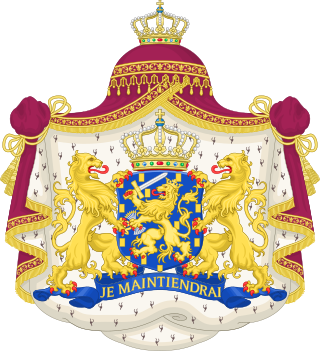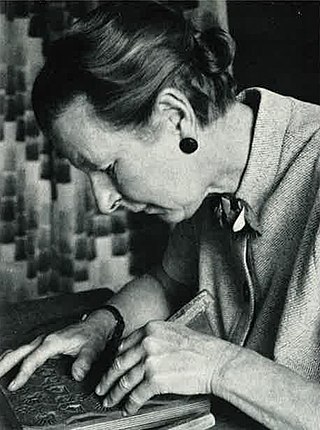Related Research Articles

Juliana was Queen of the Netherlands from 1948 until her abdication in 1980.

Amira Hass is an Israeli journalist and author, mostly known for her columns in the daily newspaper Haaretz covering Palestinian affairs in Gaza and the West Bank, where she has lived for almost thirty years.
Frances-Marie Uitti is an American cellist and composer known for her use of extended techniques and performance of contemporary classical music. Tom Service, music critic for the Guardian newspaper, has called her "arguably the world's most influentially experimental cellist."

Tie-dye is a term used to describe a number of resist dyeing techniques and the resulting dyed products of these processes. The process of tie-dye typically consists of folding, twisting, pleating, or crumpling fabric or a garment, before binding with string or rubber bands, followed by the application of dye or dyes. The manipulations of the fabric before the application of dye are called resists, as they partially or completely prevent ('resist') the applied dye from coloring the fabric. More sophisticated tie-dye may involve additional steps, including an initial application of dye before the resist, multiple sequential dyeing and resist steps, and the use of other types of resists and discharge.

Princess Laurentien of the Netherlands is the wife of Prince Constantijn and sister-in-law of King Willem-Alexander of the Netherlands.

Fumihito, Crown Prince Akishino is the younger brother and heir presumptive of the emperor of Japan and the younger son of the emperor emeritus and the empress emerita. Since his marriage in June 1990, he has had the title Prince Akishino and has headed his own branch of the imperial family.
The Prince Claus Fund was established in 1996, named in honor of Prince Claus of the Netherlands. It receives an annual subsidy from the Dutch Ministry of Foreign Affairs.

Ayu Utami is an Indonesian writer who has written novels, short-stories, and articles. Saman (1998) is widely considered her masterpiece. It was translated into English by Pamela Allen in 2005. By writing about sex and politics, Utami addressed issues formerly forbidden to Indonesian women, a change referred to as sastra wangi.

Niède Guidon is a Brazilian archaeologist known for her work in pre-historic archeology of South American civilizations and her efforts to secure the conservation of the World Heritage Site Serra da Capivara National Park.

Chief Nike Davies-Okundaye, also known as Nike Okundaye, Nike Twins Seven Seven and Nike Olaniyi, is a Nigerian Yoruba and adire textile designer. She is best known as an artist for her cloth work and embroidery pieces.

Stanley Ann Dunham was an American anthropologist who specialized in the economic anthropology and rural development of Indonesia. She was the mother of Barack Obama, the 44th president of the United States. Dunham was known as Stanley Ann Dunham through high school, then as Ann Dunham, Ann Obama, Ann Soetoro, a.k.a. Ann Sutoro, and resumed her maiden name, Ann Dunham, later in life.

Emily Jacir is a Palestinian artist and filmmaker.
Obin, real name Josephine Komara, is a textile designer from Indonesia. She is sometimes called a "national treasure" due to her passion for and promotion of traditional Indonesian batik techniques. Her work has achieved worldwide recognition, with fellow Indonesian designers such as Edward Hutabarat and Ghea Panggabean describing her as the real authority and leader of the mid-2000s movement to update and modernise batik. Despite this, Obin describes herself as simply a tukang kain, or vendor of cloth, stating that the genuine artists and designers are the craftsmen who make the textiles retailed through Bin House, her business.
The Institute for Islamic and Social Studies, is an Indonesian non-governmental organization that was founded on September 3, 1993, in Yogyakarta. The institute stimulates intellectual debate on a grassroots level.
Nidia Bustos is a Nicaraguan theater director, community organizer and cultural activist. She founded the theater organization MECATE that meanwhile consists of more than 80 theater and music groups.
Heri Dono is an Indonesian visual artist as artist painter, sculptor, and installation artist.

Madeeha Gauhar was a Pakistani TV and stage actress, playwright and director of social theater, and women's rights activist. In 1984, she founded Ajoka Theatre where social themes were staged in theaters, on the street and in public places. With Ajoka Theater, she performed in Asia and Europe. She was one of the leading actresses on Pakistan's Television screens in the 1970s, 1980s and 1990s.

Yoshiko Iwamoto Wada is a Japanese textile artist, curator, art historian, scholar, professor, and author. She has received international recognition for her scholarship and expertise in the field of textile art. In 2010, she was named a "Distinguished Craft Educator - Master of Medium" by the James Renwick Alliance of the Smithsonian Institution, who stated: "she is single-handedly responsible for introducing the art of Japanese shibori to this country". In 2016 she received the George Hewitt Myers Award for Lifetime Achievement.

Gudrun Stig Aagaard was a Danish textile artist who specialized in printed fabrics. She opened her own workshop in 1928, pioneering printed textile designs in Denmark. She initially produced classical patterns but later adopted a more abstract approach in her creations for L.F. Foght. For over 50 years, she collaborated with Haandarbejdets Fremme.

Mary Zicafoose is an American textile artist, weaver, and teacher who specializes in ikat, an ancient technique in which threads are wrapped, tied and resist-dyed before weaving. Zicafoose is the author of Ikat: The Essential Handbook to Weaving Resist-Dyed Cloth (2020). Her works are part of private and public collections, including at least 16 embassies around the world as part of the U.S. Art in Embassies Program.
References
- 1 2 3 Prince Claus Fund, profile [ permanent dead link ]
- 1 2 3 The Jakarta Post (16 December 2003) Yovita preserving Timorese heritage Archived March 5, 2016, at the Wayback Machine